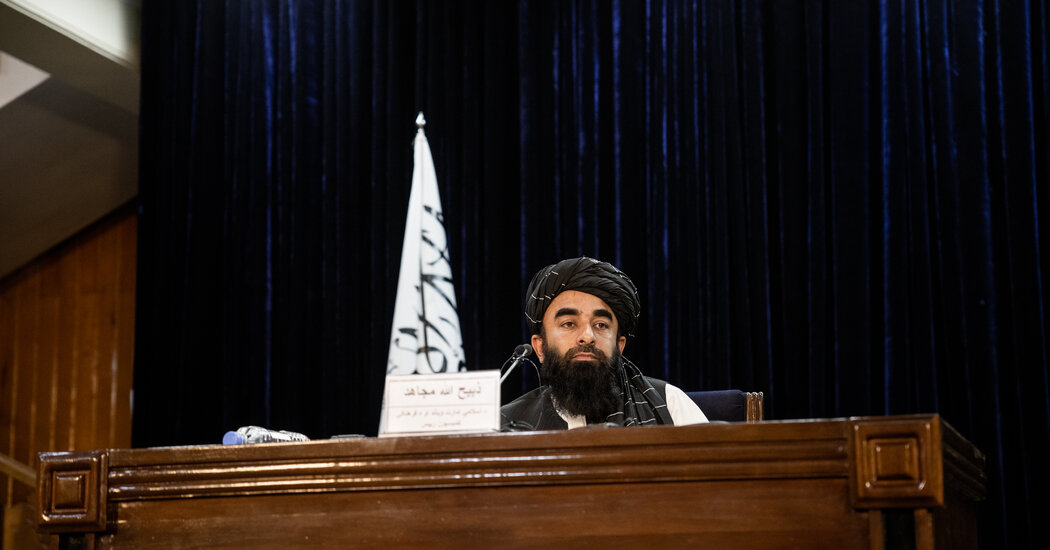The Taliban on Monday claimed to have conquered the Panjshir Valley and hoisted their flag over the last uncontrolled Afghan provincial capital, while representatives of the opposition forces there said they would continue fighting from the mountains.
If the Taliban manage to keep Panjshir under control, it would be a symbolic keystone for the group’s lightning-quick conquest and return to national power.
The Taliban never managed to control Panjshir when they last ruled Afghanistan from 1996 to 2001, and it was the starting point for the US-led invasion following the September 11, 2001 terrorist attacks on New York and the Pentagon.
Soviet forces invaded the territory at least nine times during their occupation of Afghanistan in the 1980s, but were repulsed each time, sometimes with heavy losses.
The Taliban have always been bitter against the Panjshir fighters and were complicit in the murder of their legendary commander Ahmad Shah Massoud 20 years ago.
While rumors of the Taliban’s takeover of power in Panjshir were circulating last weekend, the group did not officially claim control until Monday morning.
“Panjshir province fell entirely to the Islamic emirate of Afghanistan,” wrote Taliban spokesman Zabihullah Mujahid in a statement on Twitter.
Taliban fighters posted pictures on the Internet of militants hoisting the flag of the Islamic emirate of Afghanistan, as the Taliban call the country, in the provincial capital of Bazarak, and of their troops speaking to local leaders.
But while the Taliban claimed to have conquered the entire province, the opposition group National Resistance Front denied this account, saying that their troops were still stationed in the Panjshir Valley.
“We assure the Afghan people that the fight against the Taliban and their partners will continue until justice and freedom prevail,” it said on Twitter.
The conflicting reports of what was happening on the ground in the region 70 miles north of Kabul, the country’s capital, have been difficult to verify as internet and telephone connections to the region have been disrupted.
Resistance group leader Ahmad Massoud, son of commander Ahmad Shah Massoud, who was murdered in 2001, released an audio recording on Monday calling the nation to revolt against the Taliban.
“Wherever you are, inside or outside the country, we appeal to you to stand up in resistance for the dignity, integrity and freedom of our country,” he said, according to a transcript of the tape.
Updated
9/2/2021, 5:49 p.m. ET
He added that, despite the Taliban’s claims of seeking a peaceful negotiated solution with opposition forces, “they have launched a major military offensive against our people that has resulted in numerous casualties, including my closest family members”.
On Sunday there were reports of potentially significant casualties among resistance fighters, including the deaths of several commanders and resistance spokesman Fahim Dashti.
For their part, the Taliban tried to reassure the local population that their troops would not harm them.
“We give the honorable people of Panjshir full assurance that they will not be discriminated against,” said Mujahid, the group’s spokesman. “They are all our brothers and we will serve one country and one common purpose.”
Understanding the Taliban takeover in Afghanistan
Map 1 of 6
Who are the Taliban? The Taliban emerged in 1994 amid the unrest following the withdrawal of Soviet forces from Afghanistan in 1989. They used brutal public punishments, including flogging, amputation and mass executions, to enforce their rules. Here is more about their genesis and track record as rulers.
Who are the Taliban leaders? These are the top leaders of the Taliban, men who for years have been on the run, in hiding, in prison and dodged American drones. Little is known about them or how they plan to govern, including whether they will be as tolerant as they say they are. A spokesman told the Times that the group wanted to forget their past, but there were some restrictions.
After most of the American armed forces had withdrawn, the Taliban took over most of Afghanistan with astonishing speed. After months of heavy fighting and appalling losses, the US-trained Afghan security forces finally melted away from the militants and culminated in the Taliban’s capture of Kabul on August 15.
The Taliban have not yet officially announced the structure of their new government, but said Monday that they would offer more details soon.
In what appears to be an attempt to hold former Afghan soldiers in their laps, Mr. Mujahid said that “former forces who have been trained and are professionals” should be recruited into the new regime.
That, he added, would be done through “a process” which he did not elaborate on.
Credit…via Reuters
Nonetheless, pockets of resistance persisted in Afghanistan, particularly in the north, where the Taliban had long clashed with other paramilitary groups. At the end of August, a group of former mujahideen fighters and Afghan commandos said they had started a resistance war in Panjshir. Panjshir, a rugged area about 70 miles north of Kabul, with its mountains and rugged valleys has provided protection for insurgents since the Soviet occupation.
The Taliban have reported making gains against the resistance forces in recent days and killing some high-ranking leaders, including Mr Dashti. Ahmad Zia Kechkenni, Mr Dashti’s brother, said in an interview on Monday that the spokesman “was martyred for the defense of his people and his country, Afghanistan”.
Resistance group officials said that despite public declarations by the Taliban that they were negotiating a peaceful solution, they had never made any serious attempt at rapprochement.
Ahmadullah Wasiq, deputy head of the Taliban’s Culture Commission, denied the claim, saying his group had previously sought negotiations with the resistance. It was too late now, he said.
“You missed the opportunity,” he said, “because the mujahideen of the Islamic Emirates have taken almost the entire province. But if you want to come anyway and surrender, you are welcome. “
Carlotta Gall and Marc Santora contributed to the coverage.
